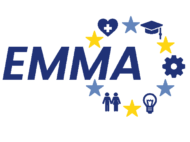The EMMA project addresses the opportunities and challenges of the ageing population in Europe by developing an interdisciplinary European Master in Active Ageing and Age-friendly Society. The master’s programme will enable future graduates to broaden their knowledge and develop skills for creating an inclusive society and meaningful active ageing promotion.
Higher education institutions in Finland, Austria, Greece, Ireland, Slovenia, and Portugal complete the international and interdisciplinary consortium. With expertise from the fields of psychology, technical sciences, social work, geriatrics, physiotherapy, and related subjects, our consortium works to create knowledge and innovative good practices both for and within the master’s programme. Student intake is to commence in 2023.
Objective
In creating this programme, the project aims to identify the necessary competences for professionals while using the concepts of healthy and active ageing and age-friendly society. The interdisciplinarity of the project team will be reflected in the curriculum of the master’s programme, which aims to create competent professionals able to innovatively solve the challenges of ageing and ageing societies, at local, national and European level. It is our intention to create a long-term, successful, and widely recognised master’s programme with a diploma recognised and signed by all partner institutions.
The EMMA master’s will be flexible as it will be delivered solely online. It will be designed with applicability and compatibility in mind, to allow professionals from many fields who recognise the need for expertise in healthy and active ageing and age-friendly society to get involved.
Activities
The process of creating this programme is guided by a series of intellectual outputs, each building on the process and results of the last:
Output 1
The needs analysis focuses on potential student learning needs and relevant policies in healthy and active ageing. The knowledge generated is gathered by scoping review and survey of the broad range of stakeholders, as well as establishing a policy repository representing 10 EU countries.
Output 2
The curriculum development establishes the framework and learning approaches of the EMMA master’s programme. This involves consultation with European, national, and institution requirements and collection of best practices from the literature and partner institutions.
Output 3
The development of the core modules relies on the results of the needs analysis and takes place in close collaboration with the next intellectual output. Structural details (e.g. ECTS) will be derived from the results of the curriculum framework.
Output 4
The elective modules take a similar developmental route to the core modules. The needs analysis and consortium-wide discussions helps to determine whether topics are deemed core or elective.
Output 5
E-learning platform and tools is the basis for module development by creating a solid, systematic, clear, flexible, and transparent framework. There is careful exploration of current practices and use of e-learning platforms, and the skills and competences of online teaching in each partner institution.
Output 6
The creation of the validation and quality assurance framework includes the development of reference quality indicators, a methodology for reviewing educational content and process, and a tool kit for internal and external review of the programme.
Output 7
The joint degree and accreditation framework is created in close consultation with the European Approach for Quality Assurance of Joint Programmes (EQAR). The consortium collaborates to collect comparisons of experiences and policies, review national legal accreditation frameworks, and agree on definitions of the organisational structure and responsibilities. The final output being a policy recommendation on the accreditation of online joint degrees to inform legislation at national and EU level.
Project Partners
Karelia University of Applied Sciences, Finland.
Lead: Raija Kuisma
Carinthia University of Applied Sciences, Austria.
Lead: Andrea Stitzel
National and Kapodistrian University of Athens, Greece.
Lead: Panagiota Sourtzi
University College Cork, Ireland.
Lead: Suzanne Timmons
University of Lisbon, Portugal.
Lead: Fátima Baptista
University of Ljubljana, Slovenia.
Lead: Jana Mali
